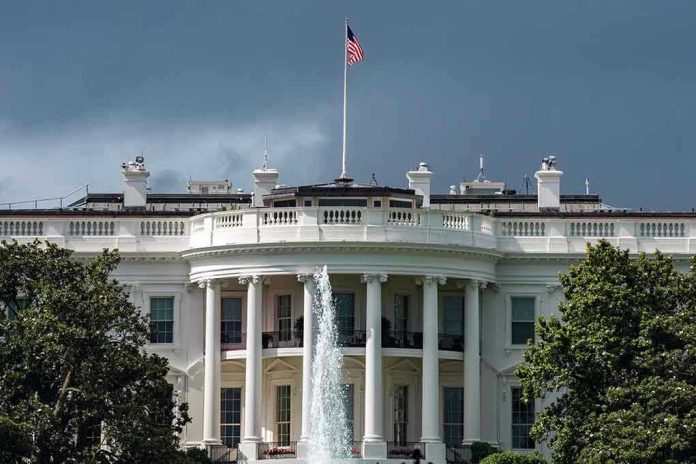
In a dramatic mix of policy and urgency, a pivotal announcement on weight-loss drug pricing was overshadowed by a medical emergency at the White House.
Story Overview
- Senior Novo Nordisk executive collapses during the announcement.
- Trump reveals a deal to slash prices on popular weight-loss drugs.
- Event highlights the urgency of affordable obesity treatments.
- Direct-to-consumer pricing model introduced for U.S. consumers.
Unexpected Drama at the White House
The Oval Office, typically a place of controlled formality, turned into a scene of medical urgency when a senior executive from Novo Nordisk collapsed during a major policy announcement by President Trump. The event was set to reveal a significant deal with pharmaceutical giants Eli Lilly and Novo Nordisk aimed at reducing the exorbitant prices of popular weight-loss drugs like Wegovy, Ozempic, and Zepbound. This sudden medical emergency momentarily halted proceedings, bringing an unexpected human element to the high-stakes policy discussion.
The executive received immediate medical assistance and was later confirmed to be stable, allowing the event to continue. The incident underscored the human dimension of the obesity crisis, highlighting the real-life stakes involved in the accessibility of life-changing medications. The urgency was palpable, both in terms of the policy’s importance and the unexpected health scare that unfolded in one of the world’s most secure venues.
A New Era in Drug Pricing
The announcement itself marked a potentially transformative moment in the landscape of healthcare affordability. President Trump’s administration unveiled a groundbreaking agreement that promises to lower the cost of weight-loss drugs dramatically. By introducing a direct-to-consumer pricing model, the administration aims to make these medications accessible to more Americans, with some prices dropping to as low as $149 per month starting January.
The move comes amidst growing scrutiny over the pricing practices of pharmaceutical companies. Historically, drugs like Wegovy and Ozempic have been financially out of reach for many, with prices exceeding $1,000 monthly before insurance. The new model not only addresses this disparity but also sets a precedent for future drug pricing negotiations, potentially influencing the broader pharmaceutical industry.
The Stakes for Consumers and the Industry
This initiative is poised to impact a vast demographic, especially those grappling with obesity and related health conditions. By increasing the accessibility of effective treatments, the policy could lead to improved public health outcomes. However, the implications extend beyond individual health, touching upon insurance coverage dynamics and pharmaceutical pricing strategies.
The direct-to-consumer model could disrupt traditional pricing structures, prompting a reevaluation of insurance policies and Medicare coverage mandates. While the short-term effects might include a surge in demand for these drugs, the long-term consequences could reshape the economics of healthcare provision and pharmaceutical profitability.
Political and Economic Implications
Politically, this initiative reinforces President Trump’s commitment to healthcare affordability, a key promise of his administration. By tackling drug pricing head-on, the administration not only addresses a critical public health issue but also gains potential political capital in the process. However, the move places pharmaceutical companies under the spotlight, inviting both praise for their cooperation and scrutiny over their pricing strategies.
Economically, the change could lead to reduced out-of-pocket costs for consumers, potentially lowering healthcare spending if obesity rates decline. Yet, the sustainability of this pricing model remains a topic of debate among health policy analysts, who stress the need for comprehensive insurance reform to support such initiatives effectively.







